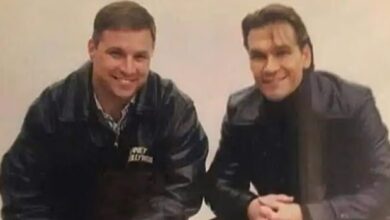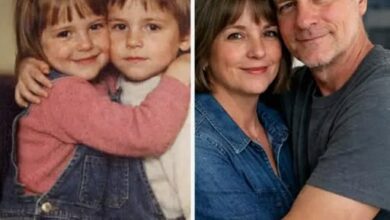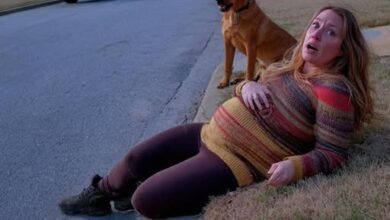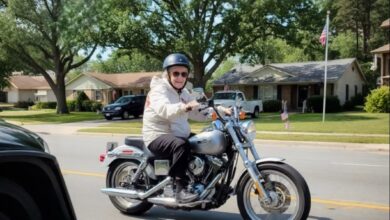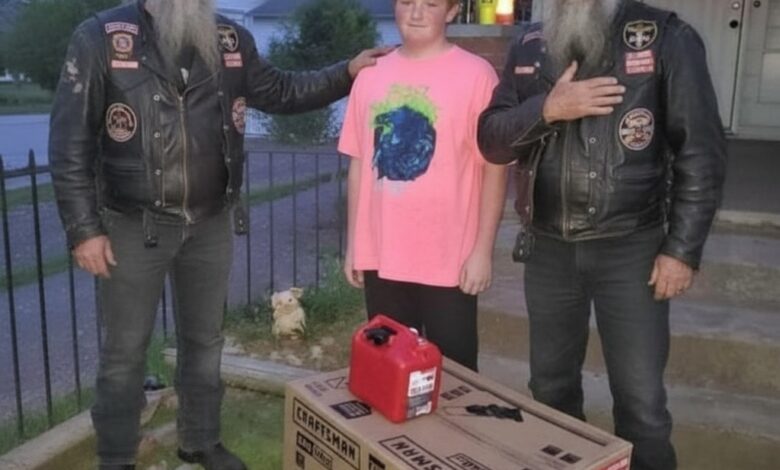
I called police on these bikers once and later on they showed up on my door and made me cry.
I’m not proud of it now, but back then I was terrified of them. They lived two houses down from me and my mom, and every evening their motorcycles would rumble down our quiet street like thunder.
I’m fourteen years old and I’d seen enough movies to know that bikers meant trouble. Gang members. Criminals. Dangerous men you stayed away from.
So when they parked their bikes in front of my house one evening and started talking loudly, I grabbed my phone and dialed 911.
“There are two biker gang members outside my house,” I whispered to the dispatcher. “They look really scary and I think they might be casing our neighborhood.”
The police came. The bikers showed them their IDs and explained they were just talking about a charity ride.
The officers left. But before they rode away, one of the bikers looked right at my window where I was watching.
He didn’t look angry. He just looked sad. That made me feel worse than if he’d yelled.
Mom worked two jobs, so I was alone most afternoons and evenings. I never told her about calling the police. I was too embarrassed.
But I kept watching those bikers from my window, convinced I’d been right about them. Their long gray beards, their leather vests covered in patches, their heavy boots—everything about them screamed danger to me.
Then Hurricane Helen hit our town. Not the actual hurricane, but the remnants of it—three days of rain and wind that knocked out power to half the county.
Our neighborhood got hit hard. Trees down everywhere. Power lines sparking in the streets.
And our generator, the one thing that kept our refrigerator running and gave us light, died on day two.
Mom cried when it happened. Not big sobs, but quiet tears she tried to hide from me.
We’d just bought $200 worth of groceries. Everything in the fridge would spoil. We didn’t have money for a new generator. We barely had money for the groceries.
“It’s okay, baby,” she told me, wiping her eyes. “We’ll figure it out. We always do.”
But I could hear the defeat in her voice. Mom was so tired. Working doubles at the diner and overnight shifts at the gas station just to keep us afloat.
And now this.
I sat on our front porch the next morning, watching neighbors with generators running their houses like nothing was wrong. The sun was out but everything was still wet and broken.
That’s when I heard the motorcycles.
The two bikers rolled up slowly, their engines rumbling low. My heart jumped into my throat.
Were they coming to confront me about calling the cops? Did they know it was me? I stood up, ready to run inside and lock the door.
They pulled into our driveway and cut their engines. Both of them climbed off their bikes, and that’s when I saw they were carrying something.
A big cardboard box between them and a red gas can.
The one with the longer beard spoke first. “Hey there, son. Your mama home?”
His voice was gentle, not threatening at all. I shook my head, not trusting myself to speak.
“She at work?” I nodded.
“We heard your generator died,” the other one said. He had kind eyes, I noticed. Wrinkles around them like he smiled a lot. “Whole neighborhood’s been talking about it. We thought maybe we could help.”
They set down the box. It was a brand new generator.
The price tag was still on it—$400.
“We can’t accept that,” I finally managed to say. My voice came out squeaky. “We don’t have money to pay you back.”
“Nobody’s asking you to pay us back, son.” The first biker pulled out the generator and started unpacking it like it was the most natural thing in the world.
“We’re your neighbors. Neighbors help neighbors. That’s how it works.”
“But… why?” The question burst out of me. “You don’t even know us.”
The two bikers looked at each other. Something passed between them, some understanding.
The one with the kind eyes crouched down so he was at my level. “Son, can I tell you something? People look at us and see scary biker guys. They cross the street when we come. They call the police on us for just existing.”
He gave me a sad smile that made my stomach twist with guilt. “But we’re just people. We’re dads and grandpas and we fix cars and volunteer at shelters and we try to do good in this world. Just because we ride motorcycles doesn’t make us bad.”
I felt my face burn red hot. He knew.
They both knew I’d called 911 on them.
“We’re not mad at you,” the other biker said, reading my expression. “You’re a kid looking out for your mama. That’s admirable.”
“But maybe this can teach you something about judging books by their covers, yeah?”
They spent the next hour setting up the generator, showing me how to fill it with gas, how to start it, how to connect it safely to our house. They worked together with an efficiency that spoke of decades of friendship.
They joked with each other and included me in their conversation, asking about school and what I liked to do.
“You like to fix things?” one of them asked when I showed interest in how the generator worked.
I nodded. “Good man. World needs more people who can fix things. You ever want to learn about engines, motorcycles, any of that stuff, you come find us. We’ll teach you.”
When they finished, they tested the generator. It roared to life, smooth and powerful.
Inside our house, the lights flickered on. The refrigerator hummed back to life.
I felt tears stinging my eyes but I fought them back.
“Thank you,” I whispered. “Thank you so much. My mom… she’s going to cry when she sees this.”
“Your mama works hard for you,” the one with the kind eyes said. “Real hard. We’ve seen her leaving at 5 AM and coming home at midnight. She’s a warrior.”
“And you’re a good son for worrying about her.” He put his hand on my shoulder, heavy and warm. “You two take care of each other. And if you ever need anything—anything at all—you knock on our door. Understand?”
I nodded, not trusting my voice anymore.
They climbed back on their motorcycles, and before they started the engines, the one with the longer beard looked back at me. “By the way, son, we’re part of a veteran’s motorcycle club. We ride for fallen soldiers and raise money for military families.”
“We’re having a charity breakfast next month. You and your mama should come. Free food, good people, and I promise nobody’s as scary as they look.”
They rode away, and I stood in our driveway crying like a baby. Not sad tears. Grateful tears.
Ashamed tears. Confused tears. All of it mixed together.
When Mom came home at midnight, exhausted and barely able to stand, she saw the lights on in the house. She saw the generator running on the side of the yard.
She found the note I’d left on the kitchen table explaining what happened.
She came into my room and hugged me so tight I could barely breathe. “Those men,” she whispered. “Those beautiful, beautiful men.”
Then she sat on my bed and told me something I hadn’t known. “Baby, those bikers have been looking out for us for months. When our mailbox got knocked over last spring? They fixed it while we were gone.”
“When someone was breaking into cars in the neighborhood? They started doing patrols at night. They’ve been guardian angels we didn’t even know we had.”
The next morning, Mom and I walked to their house. I was nervous but she held my hand and said we were going to say thank you properly.
We brought a homemade pie—it was all we had to give.
When they opened the door and saw us standing there, their faces lit up.
“We can’t thank you enough,” Mom said, her voice breaking. “You saved us. You really did.”
“Ma’am, it was our honor,” one of them said. “That’s what brothers do. And we’re all brothers and sisters in this world, whether we know it yet or not.”
I stepped forward. “I’m sorry I called the cops on you. I was wrong. I was so wrong.”
The words tumbled out of me in a rush. “I thought you were bad people but you’re the best people I’ve ever met and I’m sorry for judging you and I’m just really, really sorry.”
The biker with the kind eyes crouched down again, same as before. “Son, you just learned one of life’s most important lessons. It takes some people their whole lives to learn it and some never do.”
“You learned it at fourteen. That makes you smarter than most.” He held out his hand. “Friends?”
I shook it. “Friends.”
That was six months ago. Those two bikers, Jake and Tommy, are part of our family now.
They taught me how to change oil, how to fix a carburetor, how to ride a bicycle with no hands. They showed up to my school’s career day and talked about being veterans and what service means.
Half the kids were terrified at first, but by the end, everyone wanted to talk to them.
Last week, they took me to their motorcycle club’s charity breakfast. Dozens of bikers, all of them with long beards and leather vests and patches and loud bikes.
All of them raising money for families who’d lost soldiers. All of them proving that the scariest-looking people can have the biggest hearts.
I learned something important that day the generator died. I learned that courage isn’t about how tough you look or how loud your motorcycle is.
It’s about showing up for people who need help. It’s about seeing past fear and prejudice to the human underneath.
It’s about being the kind of person who gives when they could easily take.
Jake and Tommy are my heroes now. Not despite being bikers, but because they showed me what it really means to be one.
Brotherhood. Service. Kindness. Protection. These aren’t just words to them. They’re a way of life.
And every time I hear their motorcycles rumble down our street, I don’t feel fear anymore. I feel safe.
Because I know that those scary-looking bikers are actually guardian angels on two wheels, watching over a neighborhood that didn’t even know it needed watching.
That’s what real bikers are. And I’ll spend the rest of my life telling anyone who’ll listen.
